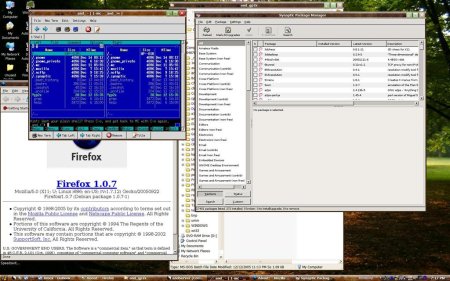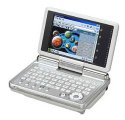Free toolset enables Linux device software development on Windows PCs
Jan 5, 2006 — by LinuxDevices Staff — from the LinuxDevices Archive — 2 views A free software project sponsored by mobile device vendor Dynamism has released a “proof-of-concept” development kit aimed at letting Windows PCs serve as development hosts for Linux-based device targets, without rebooting, partitioning or configuration. The “andLinux” project initially supports the GamePark GP2X.
A free software project sponsored by mobile device vendor Dynamism has released a “proof-of-concept” development kit aimed at letting Windows PCs serve as development hosts for Linux-based device targets, without rebooting, partitioning or configuration. The “andLinux” project initially supports the GamePark GP2X.
According to project founder David Solomon, andLinux is based on technology developed by the coLinux project, which maintains a Linux kernel port designed to run alongside another OS, such as Windows, without additional virtualization software. AndLinux also incorporates technology from the Xming project, which maintains a port of the X Window System to Windows.
And, andLinux includes a complete Debian installation, including normal Debian package management tools (dpkg, apt, synaptic, etc.). According to Solomon, “almost any Linux application will run [within andLinux] without modification,” adding “AndLinux mounts your Windows c: drive, so you can move files between Windows and Linux.”
Solomon says a future andLinux release will target non-developers interested in simply running Linux applications on Windows PCs, but points out that software development will remain the project's primary focus. “The goal of andLinux is the promotion of Linux development for Linux devices,” he states.
The current andLinux release includes an ARM-based GCC crosscompiler, SDL libraries, and the Linux kernel sources for the GP2X handheld gaming device.
Solomon explains, “[AndLinux] starts with a Linux command prompt. Inside this window, you have a Linux development environment. Typing 'source gp2x' (without quotes) will set up the GP2X cross-compile environment, and allow you to start developing for the GP2X.”

AndLinux, running on Windows XP
(Click to enlarge)
 Solomon expects the next andLinux release to add support for Sharp's Linux-based Zaurus PDAs. After that, he hopes to add support for a wide variety of devices, or scripts that will make adding additional environments easy for others. “In the next version I hope to include 'pluggable' support for additional environments. [Users will be able to] drop a virtual drive containing that environment into a folder. AndLinux should then detect the environment, mount the drive, and install any environment changes required,” he explains.
Solomon expects the next andLinux release to add support for Sharp's Linux-based Zaurus PDAs. After that, he hopes to add support for a wide variety of devices, or scripts that will make adding additional environments easy for others. “In the next version I hope to include 'pluggable' support for additional environments. [Users will be able to] drop a virtual drive containing that environment into a folder. AndLinux should then detect the environment, mount the drive, and install any environment changes required,” he explains.
Thus, the andLinux project could ultimately result in a fairly high-level toolset for porting applications between various Linux devices. Solomon explains, “AndLinux's goal is to create a single tool for developing in multiple environments. The idea is to let developers easily port applications between devices by running a command to switch between environments.”
Solomon says he chose to support the GP2X initially, because he is currently porting some of his older Zaurus applications to the new handheld gaming platform. The GP2X, which shipped last fall, sells for less than $200, and is powered by dual ARM-based processors.
Solomon is currently the primary (and only) andLinux developer. However, he hopes the project will soon attract others. “The OS is completely open sourced, and available to the community. It will be opened to all developers soon, as the project is very ambitious, and it already has more users then I ever imagined. I just need to find some time to create a sourceforge site (or one like it).”
He adds, “Please understand that I am just 'putting andLinux together.' The real credit goes to the Debian team, CoLinux, and Xming developers. These are the true developers of this project, and it is their work that makes it possible.”
Solomon also credits Dynamism with initiating and supporting the project, through test systems, direction, and focus. He notes, “[Dynamism] may [offer andLinux] support via email in the future, but the specifics are not completely worked out yet.”
For now, additional information about the andLinux project can be found here.
This article was originally published on LinuxDevices.com and has been donated to the open source community by QuinStreet Inc. Please visit LinuxToday.com for up-to-date news and articles about Linux and open source.